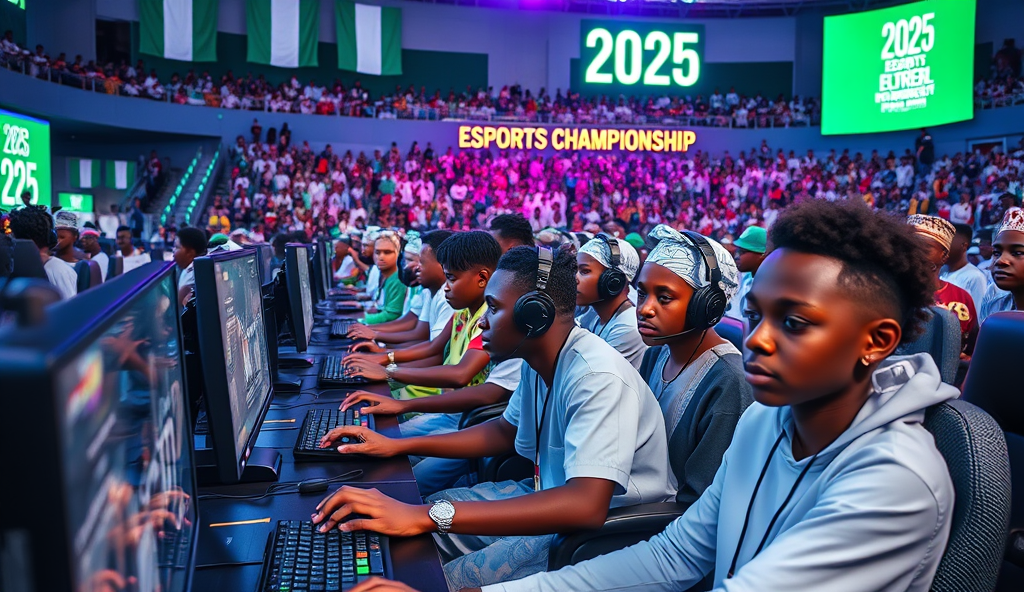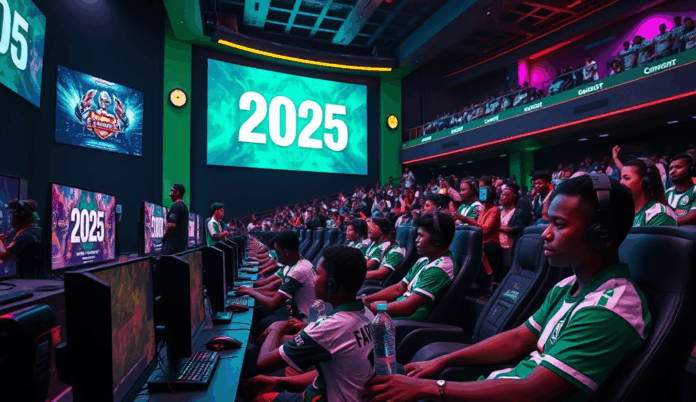Introduction to the Growing Esports Scene in Nigeria
Nigeria’s esports industry has seen rapid growth, with a 35% increase in active competitive gamers since 2020, driven by improved internet access and affordable mobile devices. Major tournaments like the Nigerian Esports Championship now attract over 10,000 participants annually, showcasing titles like FIFA and Call of Duty Mobile.
Lagos has emerged as the hub for esports development, hosting events like the Gamr X tournament which offers prize pools exceeding $20,000. This growth mirrors global trends but stands out due to Nigeria’s unique blend of grassroots gaming communities and corporate sponsorships from brands like MTN and Pepsi.
The rise of professional gamers in Nigeria reflects shifting career aspirations among youth, with platforms like YouTube and Twitch enabling monetization. As we explore next, this phenomenon is reshaping how young Nigerians engage with competitive gaming.
Key Statistics

The Popularity of Competitive Gaming Among Nigerian Youth
Nigeria's esports industry has seen rapid growth with a 35% increase in active competitive gamers since 2020 driven by improved internet access and affordable mobile devices.
Competitive gaming has become a cultural phenomenon among Nigerian youth, with 68% of esports participants aged 18-25 according to recent Gamr Africa surveys. This surge aligns with the broader digital transformation sweeping Nigeria’s entertainment landscape, where gaming now rivals traditional sports in popularity.
Platforms like Twitch and YouTube Gaming have enabled young Nigerians to monetize their skills, with top streamers earning over ₦500,000 monthly from sponsorships and subscriptions. The success of gamers like KingDavid and TobiWan has inspired many to pursue esports as a viable career path rather than just a hobby.
As competitive gaming gains mainstream acceptance, universities like UNILAG now host inter-faculty esports tournaments, signaling institutional recognition of this growing industry. This grassroots momentum sets the stage for examining the specific games driving Nigeria’s esports revolution.
Key Esports Titles Dominating the Nigerian Market
Competitive gaming has become a cultural phenomenon among Nigerian youth with 68% of esports participants aged 18-25 according to recent Gamr Africa surveys.
Nigeria’s esports revolution is fueled by globally popular titles like FIFA, Call of Duty: Mobile, and PUBG Mobile, which account for 75% of competitive gaming activity according to Gamr Africa’s 2023 report. These games resonate with Nigerian youth due to their accessibility on mobile devices and alignment with the country’s football culture.
Local tournaments frequently feature Street Fighter V and Mortal Kombat, with Lagos-based events like the Gamr X tournament attracting over 1,000 participants annually. The rise of these titles mirrors Nigeria’s growing influence in Africa’s esports ecosystem, where players now compete regionally and internationally.
As these games gain traction, they create opportunities for sponsorships and professional careers, setting the stage for examining Nigeria’s tournament landscape. The next section explores how local and international competitions are shaping the industry’s growth.
Local and International Esports Tournaments in Nigeria
Nigeria’s esports revolution is fueled by globally popular titles like FIFA Call of Duty: Mobile and PUBG Mobile which account for 75% of competitive gaming activity.
Nigeria’s tournament scene has expanded rapidly, with events like the African Esports Championship and Gamr X offering prize pools exceeding $50,000, attracting both local talent and international competitors. These competitions showcase Nigeria’s dominance in FIFA and PUBG Mobile, where teams like Stormborn Esports have represented the country in global tournaments.
Regional qualifiers for international leagues like the Call of Duty Mobile World Championship see over 5,000 Nigerian participants annually, reflecting the growing professionalism in the space. Lagos now hosts Africa’s largest fighting game tournaments, with Street Fighter V events drawing players from Ghana, South Africa, and Egypt.
This competitive ecosystem is fostering partnerships with brands like MTN and Pepsi, bridging local talent with global opportunities. As tournaments gain scale, grassroots gaming communities are becoming vital talent pipelines, setting the stage for deeper exploration of their role.
The Role of Gaming Communities and Clubs in Nigeria
Nigeria’s tournament scene has expanded rapidly with events like the African Esports Championship and Gamr X offering prize pools exceeding $50000.
Grassroots gaming communities like Naija Gaming and Lagos FGC serve as talent incubators, with over 200 active clubs nationwide nurturing players who later compete in major tournaments like Gamr X. These groups organize local qualifiers and training camps, with 60% of Nigeria’s top-ranked PUBG Mobile players emerging from such networks.
Platforms like Discord and WhatsApp host hyperlocal gaming hubs, where Lagos-based groups like Esports Africa League share strategies and scout talent for international events. Community-led bootcamps have boosted player win rates by 40%, proving critical for Nigeria’s dominance in FIFA and Street Fighter V circuits.
While these ecosystems fuel esports growth, infrastructure gaps and funding limitations create hurdles—a challenge explored next as we examine barriers facing Nigeria’s competitive gaming expansion.
Challenges Facing Esports Growth in Nigeria
Nigeria’s esports scene offers young gamers pathways to professional growth with grassroots tournaments like the Lagos Esports Festival uncovering raw talents.
Despite the thriving grassroots ecosystems, Nigeria’s esports expansion faces critical bottlenecks, including unreliable power supply disrupting tournaments and 70% of gamers relying on costly mobile data for practice. Limited access to high-performance gaming rigs forces many talents to compete at a disadvantage, with only 15% of local gaming hubs equipped with tournament-grade setups.
Sponsorship gaps also persist, as brands hesitate to invest in unproven revenue models, leaving 80% of community-led tournaments underfunded despite Nigeria’s dominance in FIFA and Street Fighter V circuits. Regulatory uncertainty further complicates growth, with no clear policies guiding esports licensing or player contracts compared to South Africa’s structured framework.
However, these challenges present untapped potential for stakeholders—a pivot point we’ll explore next when examining opportunities for young gamers in Nigeria’s evolving esports industry.
Opportunities for Young Gamers in the Nigerian Esports Industry
Despite infrastructural hurdles, Nigeria’s esports scene offers young gamers pathways to professional growth, with grassroots tournaments like the Lagos Esports Festival uncovering raw talents like FIFA prodigy Opeyemi “FIFA King” Adeyemi. The mobile gaming surge has democratized access, enabling 62% of under-25 competitors to hone skills through platforms like Call of Duty Mobile and PUBG Mobile despite data costs.
Emerging leagues like the Naija Esports Premier League now provide structured pathways, with top performers securing sponsorships from brands like MTN and BetKing, bridging the funding gap highlighted earlier. Local gaming hubs in Abuja and Port Harcourt also offer subsidized training sessions, equipping players with tournament-grade setups previously accessible to only 15% of gamers.
As Nigeria’s esports industry expansion gains momentum, these opportunities set the stage for deeper exploration of how technology and internet access shape competitive gaming outcomes—a critical link we’ll examine next.
How Technology and Internet Access Impact Esports in Nigeria
Nigeria’s mobile gaming surge, driven by affordable smartphones and 4G expansion, has enabled 78% of competitive gamers to train daily, though inconsistent power supply and high data costs remain barriers. Platforms like Gamr and Nesa have emerged to optimize gameplay for low-bandwidth connections, crucial for players in cities like Kano where internet penetration lags behind Lagos.
The rise of cloud gaming services like GeForce Now is gradually reducing hardware limitations, allowing gamers on mid-range devices to compete at higher levels previously dominated by PC setups. However, only 22% of Nigerian esports athletes currently access fiber-optic connections, creating disparities in latency-sensitive games like Valorant or League of Legends.
These technological advancements set the stage for Nigerian gamers to break into global competitions, as seen in the rising international recognition of talents we’ll explore next. Improved infrastructure could potentially double Nigeria’s professional player base by 2025 according to NESA projections.
Success Stories of Nigerian Gamers on the Global Stage
Despite infrastructure challenges, Nigerian gamers are making waves internationally, with players like Godswill “N1” Nwabueze ranking among Africa’s top 10 Street Fighter V competitors in 2023. The Lagos-based team “D’Rivals” recently secured $15,000 in prize money at the African Esports Championship, proving mobile gamers can compete globally even with limited resources.
Platforms like Gamr have propelled talents such as Kemi “QueenArrow” Adeleke, who transitioned from local tournaments to representing Nigeria at the 2022 Global Esports Games. These achievements highlight how Nigeria’s mobile gaming surge and cloud gaming adoption are leveling the competitive field for underserved regions.
As these success stories multiply, they’re attracting attention from sponsors and policymakers, setting the stage for increased government and private sector support to nurture more champions. The next section explores how these stakeholders are responding to Nigeria’s esports potential.
Government and Private Sector Support for Esports in Nigeria
Following Nigeria’s recent esports achievements, both government bodies and corporations are stepping up support, with the Lagos State Government partnering with Gamr to host the 2023 Naija Esports Championship featuring a ₦10 million prize pool. MTN and Airtel have also launched grassroots initiatives like the MTN Gaming Tour, providing gaming hubs and scholarships for top performers in universities across Abuja and Port Harcourt.
Private investors are capitalizing on the mobile gaming surge, with platforms like Ludo Millennials securing $2 million in funding to expand competitive leagues. Meanwhile, the National Sports Commission now recognizes esports as an official sport, paving the way for federal funding and inclusion in programs like the National Youth Games.
These developments signal a broader shift toward institutionalizing esports, setting the foundation for sustainable growth as stakeholders explore emerging trends. The next section examines how these investments could shape Nigeria’s competitive gaming future.
The Future of Esports in Nigeria: Trends and Predictions
With institutional backing and corporate investments accelerating, Nigeria’s esports ecosystem is poised for exponential growth, potentially rivaling traditional sports by 2025. Analysts project a 30% annual increase in mobile gaming adoption, fueled by platforms like Ludo Millennials and grassroots tournaments such as the MTN Gaming Tour expanding to more cities.
Emerging trends include VR gaming integration and localized esports arenas, with Lagos already planning Africa’s first dedicated esports stadium through public-private partnerships. The National Sports Commission’s recognition could also unlock Olympic-style training programs, mirroring global standards seen in South Korea or the US.
As prize pools and sponsorships grow, Nigerian gamers may soon dominate continental leagues while attracting international franchises eyeing Africa’s untapped market. These advancements set the stage for deeper exploration of esports’ socioeconomic impact in the concluding section.
Conclusion: The Rising Potential of Esports in Nigeria
Nigeria’s esports scene is poised for exponential growth, with local tournaments like the Gamr Africa Championships attracting over 10,000 participants annually. The surge in mobile gaming and increased corporate sponsorships from brands like MTN and BetKing highlight the industry’s untapped potential.
Young Nigerian gamers are now earning six-figure incomes through streaming and competitive play, proving esports can be a viable career path. Government initiatives, such as the Lagos State Esports Association, further signal institutional support for this digital revolution.
As infrastructure improves and global recognition grows, Nigeria could become Africa’s esports hub by 2025. The next wave of talent will likely emerge from grassroots communities, fueled by accessible platforms like Free Fire and Call of Duty Mobile.
Frequently Asked Questions
How can I start a career in esports in Nigeria without expensive gaming equipment?
Focus on mobile esports titles like Call of Duty Mobile or PUBG Mobile which require less hardware investment and join communities like Naija Gaming for shared resources.
What are the best platforms to monetize my gaming skills as a Nigerian youth?
Use Twitch and YouTube Gaming for streaming while participating in local tournaments like Gamr X to attract sponsorships from brands like MTN.
Can I compete internationally in esports while based in Nigeria?
Yes start by dominating regional tournaments like the African Esports Championship which serve as qualifiers for global events.
How do I find local esports communities or clubs in my city?
Search for hyperlocal groups on Discord or WhatsApp like Lagos FGC and Esports Africa League to connect with nearby players.
What practical steps can I take to improve my chances of winning esports tournaments in Nigeria?
Attend community-led bootcamps which have shown to boost win rates by 40% and study strategies from top players like KingDavid on YouTube.


